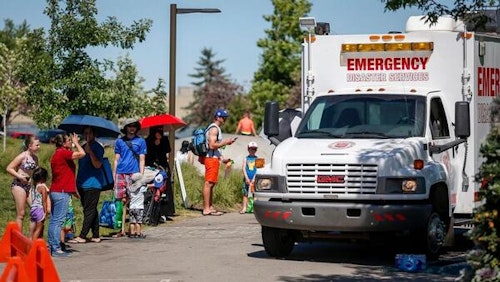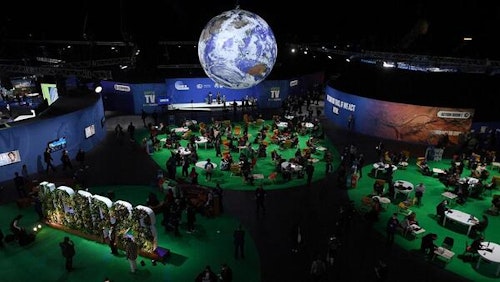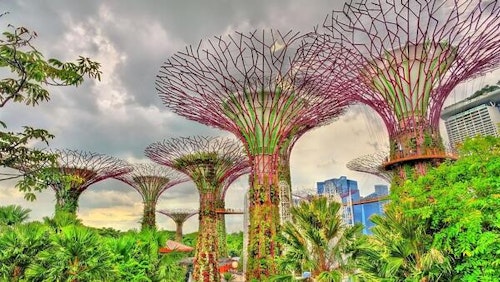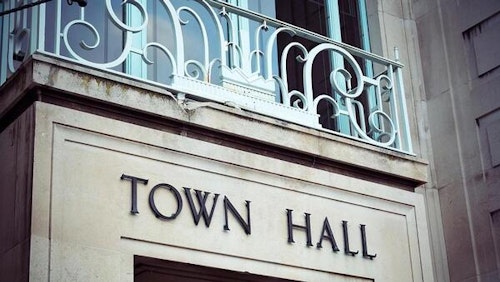A US-China deal receives a cautious welcome as COP26 turns its focus to building greener cities. Here is what you need to know as Day 11 gets underway.
As COP26 draws to a close, the announcement of a bilateral deal by the US and China to redouble climate efforts has brought cautious optimism to exhausted negotiators.
Here is what you need to know as Day 11 gets underway:
- The joint statement issued by Washington and Beijing calls for "enhanced climate action in the 2020s", including a new stronger emission cuts target in 2025 and a pledge by China to follow the US lead in slashing methane emissions.
- UN Secretary-General Antonio Guterres and others hailed it as "an important step in the right direction." But some analysts thought the deal "lacked meat" on concrete commitments besides those on methane.
- Today is Cities Day at COP26. The summit turns its focus to building sustainable urban centres, with 68% of the global population projected to live in cities by 2050.
Denmark and Costa Rica launched an ambitious alliance to phase out coal and gas. Six full members, France, Greenland, Ireland, Quebec, Sweden and Wales joined the group known as the '**Beyond Oil and Gas Alliance'. **
UN chief Antonio Guterres said today that the goal of limiting global warming to 1.5C was "on life support,'' with COP26 talks so far not reaching any of the UN’s three goals.
Tough negotiations involving almost 200 countries continue in Glasgow after a draft cover deal was released yesterday.
In case you weren't able to follow along on Wednesday, here are five takeaways from Day 10.
Follow our live updates:

 ${title}
${title}
Live ended
EU criticised for backing €13bn gas projects
“For the EU to be talking about climate leadership while pumping billions of euros of public money into fossil gas reeks of hypocrisy," said Nick Bryer, 350.org’s European Campaigns Director.
EU to push for finance pledge to be delivered to poor countries, say bloc's officials
European Union officials say they will push for a strong signal on financial support for poor countries to cope with global warming, a key sticking point at COP26.
Frans Timmermans, the EU’s vice-president and top climate official, said Thursday that rich countries “need to make sure we actually do what was promised on the $100 billion” (EUR 86 billion) — a sum they pledged to give poor nations each year by 2020 but have so far failed to do.
Peter Liese, a senior member of the European Parliament, said he and fellow lawmakers would push for the $100 billion to be delivered “definitely next year.”
Timmermans acknowledged poor nations’ gripes that not enough of the aid is earmarked for them to adapt to climate change, but insisted spending on emissions reduction remains important.
With AP
Climate pledges 'hollow' with fossil fuels exit: UN chief
Austria minister says talks may enter extra time
Austria’s environment minister says she's preparing for another day or two of tough negotiations at COP26 that is officially scheduled to wrap up on Friday evening.
“We still have two intense days, and likely also at least one intense night, possibly two, ahead of us,” Leonore Gewessler told The Associated Press.
“We are now in the phase of the conference where many of the papers are already on the table as proposals, with a lot of different options that still need to be talked through,” said Gewessler.
Austria and its EU allies would be pushing for an “ambitious” agreement, she added. “A strong signal on protecting the climate has to be sent from Glasgow.”
Watch live: Leaders outline role of non-state actors in tackling climate crisis
WHO tells COP26 it's urgent to reduce emissions for our health
"Climate change is already threatening our health, our future survival," he said.
The good news however is that reducing emissions would immediately benefit our health through improved air quality. The urgency is clear," he added.
Developing countries accuse North of 'carbon colonialism'
A group of developing nations said that rich countries were trying to shift the burden of combating climate change onto poorer nations.
The ongoing climate talks in Glasgow were at a point onThursday where two pathways were possible, according to Bolivia’s chief negotiator, Diego Pacheco Balanz: One is good for people and the planet, and the other leads to “carbon colonialism,” he said.
“We need to fight the developed countries against the carbon colonialism,” Balanz said.
Balanz was speaking on behalf of a negotiating block of developing countries called the Like-Minded Developing Countries or LMDC and includes countries from Africa, Latin America and Asia, including China and India.
He said that rich nations were trying to impose new rules like net-zero targets for all countries without taking into account the historic responsibility that richer nations have for climate change. Balanz said poor countries would be “trapped” by such targets because only the rich nations would have the finance or technology to meet them.
With AP
READ: The first person to be diagnosed with climate change lives in Canada

5 EU countries oppose saying nuclear is green
Five European Union countries on Thursday pushed back against efforts to define nuclear energy as a climate-friendly technology in the 27-nation bloc.
The declaration made on the sidelines of COP26 was backed by Austria, Denmark, Germany, Luxembourg and Portugal.
“Nuclear power cannot be a solution in the climate crisis,” German Environment Minister Svenja Schulze said.
She argued that nuclear power was too risky, too slow and not sustainable.
The five countries said adding nuclear power to the EU-approved list of climate-friendly technologies risked diverting funds from renewable energies such as wind and solar power.
France and several other EU nations have said they want to use nuclear energy as part of their efforts to phase out fossil fuel plants.
With AP
READ: Denmark and Costa Rica launch ambitious alliance to phase out oil and gas

Major European countries pledge to phase out oil and gas
Headed up by Costa Rica and Denmark, a number of new members of the Beyond Oil and Gas Alliance were announced today.Activists hail 'Beyond Oil and Gas Alliance', urge more countries to join
As Costa Rica and Denmark are officially launching the Beyond Oil and Gas Alliance, several civil societies organisations have welcomed the move in a statement.
“The launch of the Beyond Oil and Gas Alliance is a turning point. For far too long, climate negotiations have ignored the basic reality that keeping 1.5ºC alive requires an equitable global plan to keep fossil fuels in the ground," said Romain Ioualalen, Global Policy Campaign Manager at Oil Change International.
"The creation of this alliance puts to shame claims of climate leadership among countries like the United Kingdom, Norway, the United States, and Canada, all of which have yet to answer this simple question: Where is your plan to stop producing the fossil fuels that are driving the climate crisis?," he added.
" If this alliance can convince more countries and regions to join, isolates laggards, and pushes its members towards more ambition, then it will be a success,” Ioualalen said.
The statement says "Costa Rica, Denmark, France, Greenland, Ireland, Québec, Sweden and Wales will join this alliance as full members."
"California and New Zealand will also join the alliance as associate members. Italy has also expressed their support to the coalition by becoming a Friend of BOGA," the statement read.
Watch live: New alliance to phase out oil and gas is launched
The Beyond Oil and Gas Alliance led by Denmark and Costa Rica will launch at 1:45pm CET.
The group describes itself as "a first-of-its-kind alliance of governments committed to an ambitious and managed phase-out of oil and gas production."
The list of signatories will be announced at the launch event.
Watch it live here:
200 scientists urge COP26 'to fully acknowledge climate change science'
'We're not there yet', says COP26 chair
UN chief says global warming goal on 'life support'
United Nations Secretary-General Antonio Guterres says the goal of limiting global warming to 1.5 degrees Celsius is “on life support” with climate talks in Glasgow so far not reaching any of the UN’s three goals.
But he added that “until the last moment, hope should be maintained.”
In an exclusive interview on Thursday with The Associated Press, Guterres said COP26 talks “are in a crucial moment” and need to accomplish more than securing a weak deal that participating nations agree to support.
“The worst thing would be to reach an agreement at all costs by a minimum common denominator that would not respond to the huge challenges we face,” Guterres said.
That’s because the overarching goal of limiting warming since pre-industrial times to 1.5 degrees Celsius by the end of the century “is still on reach but on life support,” Guterres said. The world has already warmed 1.1 degrees Celsius , leaving less than a degree before the threshold is hit.
“It is the moment to reach agreement by increasing ambition in all areas: mitigation, adaptation and finance in a balanced way,” Guterres said.
With AP
Beyond Oil and Gas Alliance launches today
The Beyond Oil and Gas Alliance led by Denmark and Costa Rica will launch at 1:45pm CET.
The group describes itself as "a first-of-its-kind alliance of governments committed to an ambitious and managed phase-out of oil and gas production."
The list of signatories will be announced at the launch event.

READ: How did Singapore become a biophilic city?
After destroying 95% of its vegetation, the city has managed to establish itself as a beacon for green infrastructure.'Neither US nor China wanted to be villain of COP', says think-tank
US-China climate pact is 'floor for action' but more needed: Greenpeace
"I think it really just provides the floor for action. It prevents a disengagement between the two countries, but for us to solve the climate challenge there’s clearly much more that the two countries need to do," said Li Shuo, Policy Advisor at Greenpeace China.
"We need to bring the political desire from this joint statement into the multilateral setting, and I think the US and China need to understand that the issue of climate change is not only one of their bilateral issues, but is actually a matter of life or death to many more vulnerable countries. So in that regard, ambition needs to be based on their joint statement and needs to be built further up in the next few days in Glasgow," he added.
'Time is running out', Pope tells COP26
Can the US-China deal be a game-changer at COP26?
“While this is not a gamechanger in the way the 2014 US-China climate deal was, in many ways it’s just as much of a step forward given the geopolitical state of the relationship,” said Thom Woodroofe, an expert in US.-China climate talks. “It means the intense level of US-China dialogue on climate can now begin to translate into cooperation.”
The gesture of goodwill comes just days after President Joe Biden blamed Chinese President Xi Jinping’s and Russian President Vladimir Putin’s failure to attend talks in person for the lack of more progress in climate negotiations.
UN Secretary-General Antonio Guterres called the move “an important step in the right direction.”
Some experts noted the deal was short on commitments that would significantly reduce heat-trapping gases.
“It’s a good sign that the world’s two biggest emitters can actually work together to face the biggest crisis of humanity but there’s not a lot of meat there after the methane stuff,’’ said Byford Tsang a China policy analyst for the European think tank E3G.
With AP
What's in the US-China deal on climate?
The world’s top carbon polluters, China and the United States, agreed on Wednesday to increase their cooperation and speed up action to tackle the climate crisis.
The move signals a mutual effort on global warming at a time of tension over their other disputes.
In back-to-back news conferences, Chinese climate envoy Xie Zhenhua and US counterpart John Kerry said the two countries would work together to accelerate the emissions reductions required to meet the goals of the 2015 Paris Agreement.
Both sides recognize that there is a gap between efforts taken globally to reduce climate pollution and the goals of the Paris deal, Xie said.
China also agreed for the first time to crack down on methane leaks, following the lead of the Biden administration’s efforts to curb the potent greenhouse gas. Beijing and Washington agreed to share technology to reduce emissions.
The US and China will also revive a working group that will “meet regularly to address the climate crisis and advance the multilateral process, focusing on enhancing concrete actions in this decade,” the declaration said.
Both Washington and Beijing intend to update the world on their new national targets for 2035 in 2025 — a move that is particularly significant for China.
The declaration also said China will “make best efforts to accelerate” its plans to reduce coal consumption in the second half of this decade.
To read the full joint statement, click here.
With AP

READ: City heat: How the UN plans to cool down our rapidly warming cities
The UN, warning some cities could be 4C hotter by 2100, has published its handbook at COP26 advising governments on how they can cool their cities down.Austrian climate minister says train needs to be made best option












